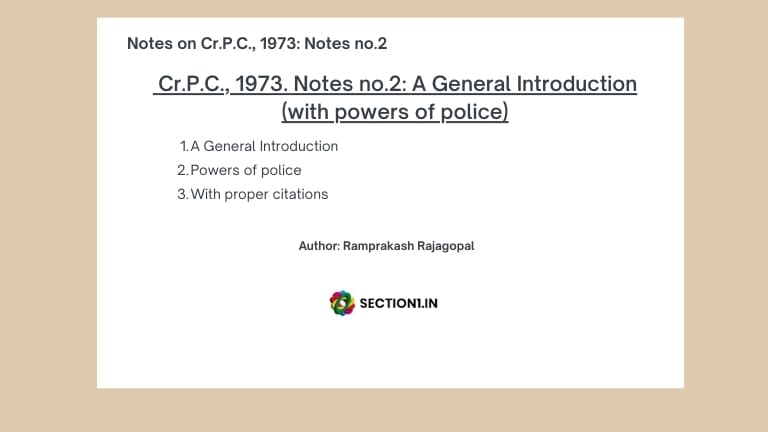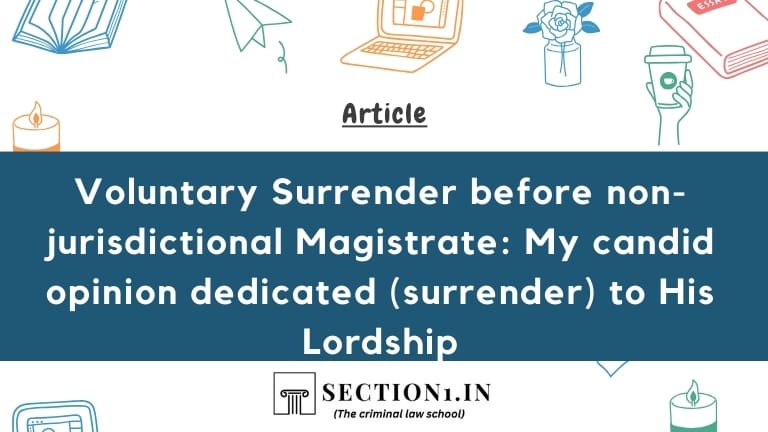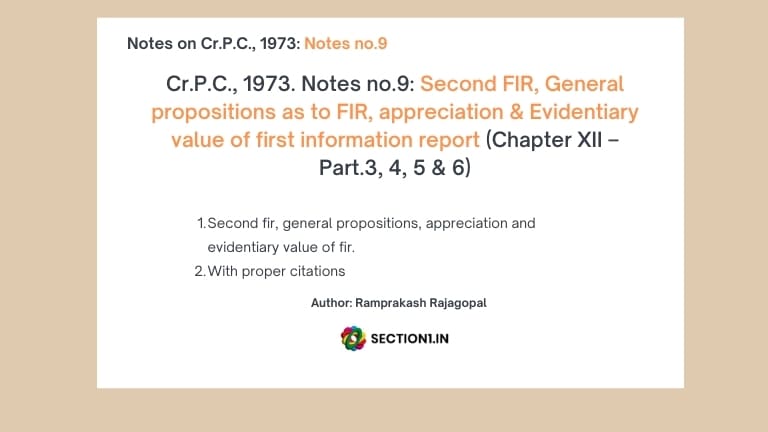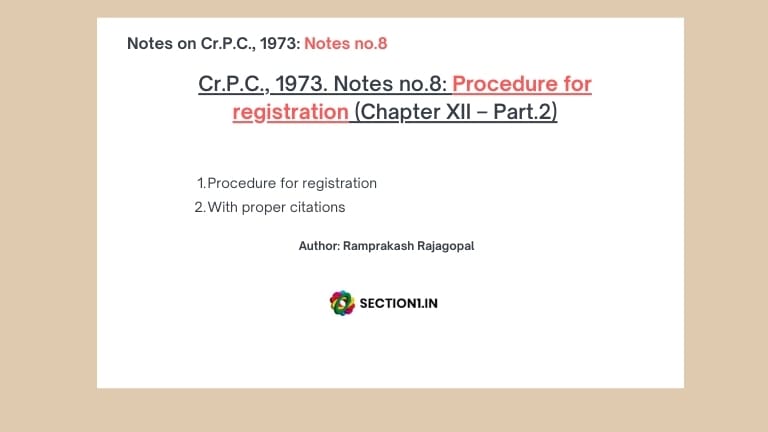A General Introduction
Criminal proceeding – what is?
A criminal proceeding is ordinarily one in which if carried to its conclusion it may result in the imposition of sentences such as death, imprisonment, fine or forfeiture of property. It also includes proceedings in which in the larger interest of the state, orders to prevent apprehended breach of the peace, orders to bind down persons who are a danger to the maintenance of peace and order, or orders aimed at preventing vagrancy are contemplated to be passed [S.A.L. Narayan Row and Ors vs. Ishwarlal Bhagwandas and Ors – AIR 1965 SC 1818].
The golden thread which runs through the administration of justice in criminal cases is that of two views are possible, one pointing to the guilt of the accused and the other to the innocence, the view which is favourable to the accused should be adopted [Allarakha K.Mansuri vs. State of Gujarat – (2002) 3 SCC 57=2002 SCC (Cri) 519].
Criminal proceeding – Whether a criminal prosecution can continue against dead person
It is too well settled that a prosecution cannot continue against a dead person. A fortiori a criminal court cannot continue proceedings against a dead person and find him guilty. Such proceedings and the findings are contrary to the very foundation of criminal jurisprudence. In such a case the Accused does not exist and cannot be convicted [U. Subhadramma and Others vs. State of A.P – 2016(3) MWN (Cri) 94 (SC)].
Police under the control of court
In a Criminal case, the police always act under the direct control of the court and have to take orders from at every stage of an inquiry or trial. In this broad sense, therefore, the court exercises an overall control on the actions of the police officers in every case where it has taken cognizance [AIR 1977 SC 1749=1977 Cr.L.J 1141 (SC) – Basava kom dyamogonda patil vs. State of Mysore].
What is the importance of objections [S.465(2) Cr.P.C]?
Section 465[1]. Finding or sentence when reversible by reason of error, omission or irregularity. – (1) Subject to the provisions hereinbefore contained, no finding, sentence or order passed by a Court of competent jurisdiction shall be reversed or altered by a Court of appeal, confirmation or revision on account of any error, omission or irregularity in the complaint, summons, warrant, proclamation, order, judgment or other proceedings before or during trial or in any inquiry or other proceedings under this Code, or any error, or irregularity in any sanction for the prosecution, unless in the opinion of that Court, a failure of justice has in fact been occasioned thereby.
(2) In determining whether any error, omission or irregularity in any proceeding under this Code, or any error, irregularity in any sanction for the prosecution has occasioned a failure of justice, the Court shall have regard to the fact whether the objection could and should have been raised at an earlier stage in the proceedings.
Cr.P.C speaks about objection on procedural defects happened in or done by the court (e.g., cognizance wrongly taken, particular charges not framed e.t.c…). Suppose if the accused through a lawyer failed to take defence such as juvenile/insanity, such defence may be taken even before the Hon’ble Supreme court, at that time not even the Supreme Court can stop a person to take his legal right of taking defence. Also, there is another type of objection which is available during the Evidence taking (on deposition). Now, what I am placing before you is taking objections in procedural defects under the Cr.P.C and not defense or evidentiary objections as stated above.
We agree that the omission to take the objection in the grounds of appeal is not necessary fatal; everything must depend on the facts of the case; but the fact that the objection was not taken at an earlier stage, if it could and should have, been taken, is a material circumstance that will necessarily weigh heavily against the accused particularly when he has been represented by counsel throughout [K.C.Mathew and Others vs. State of Travancore – Cochin – AIR 1956 SC 241=1956(1) SCJ 213=1955(2) SCR 1057=1956 Cr.L.J 444(SC) – (3 Judge Bench)].
Objection – 313 Cr.P.C[2]:
In the present case, the appellant had not raised any contention in the High Court that he was seriously prejudiced by the way in which 313 question was done. If this defect in procedure under section 313 Cr.P.C had been pointed out, the High Court could have very well remitted the case to the Sessions Court for a proper examination. At this stage, we are not inclined to accept this contention of the appellant especially when the accused was not able to show that he was in any way prejudiced by such irregular procedure [Naval Kishore vs. State of Bihar – AIR 2004 SC 4421=2004 Cr.L.J 4252 (SC)=2004(7) SCALE 126]
What is Prima facie case?
What is meant by a prima facie case? It only means that there is ground for proceeding. Further Calcutta High Court held that a prima facie case is not the same thing as ‘proof’ which is nothing but belief according to the condition laid down in the Act. It is a fallacy to say that because a Magistrate has found a prima facie case to issue process, therefore, he believes the case to be true in the sense that the case is proved [Sher Singh vs. Jitendranath Sen – AIR 1931 Cal 607].
Whether Judge can question the accused?
But the question for consideration is that when the power is sought be invoked where the Magistrate by virtue of the specific provisions of the statute is enabled to find a prima facie case by reference to unprovable, untested and possibly inadmissible documents on which the prosecution proposes to rely, whether to such a case those considerations necessarily apply. If without evidence, properly so called, a Magistrate examines an accused he would be converting him into an Investigation Agency and there is therefore every possibility of the accused being prejudiced and that might be the very reason why the sub-section has been framed, in a manner to avoid this result [Ramnarayan mor and another vs. The State of Maharashtra – AIR 1964 SC 949=(1964)5 SCR 1064=(1964)2 Cr.L.J 44(SC) (5 Judge Bench)].
Criminal Proceeding or Civil proceeding which will prevail over
Supreme Court has analyzed and discussed in so many cases since the Independence regarding the legal position and fiction whether the civil proceedings or decisions will be binding over the Criminal proceedings? the answer is in negative, because “Principle of law is such that civil court does not have any bearing so far as Criminal Case is concerned and vice – versa”. Standard of proof is different in Civil & Criminal cases. Karamchand case was the first direct precedent of the Supreme Authority regarding the civil case bearing over Criminal case and as follows:
In M/S. Karamchand Ganga Prashad &other V. Unoin of India [AIR 1971 SC 1244] “It is well established principle of law that the decisions of the civil courts are binding on the criminal courts. The converse is not true”.
The above case is “PER INCURIUM” in Syed Aksari Hadi Ali Augustine Iman & another V. State (Delhi Admn) & anr [(2009)5 SCC 528]; this court considered all the earlier judgments on the issue and held that while deciding the case in Karamchand (supra) this court failed to take note of the Constitution Bench Judgment in M.S.Sherif V. The State of Madras & other, “We are of the opinion that the Criminal matters should be given precedence and therefore, it remains ‘per incurium’ and does not lay down the correct law”. In P. Swaroopa Rani v. M. Hari Narayana @ Hari Babu , it was held that “it is well-settled that in a given case, civil proceedings and criminal proceedings can proceed simultaneously. Whether civil proceedings or criminal proceedings shall be stayed depends upon the fact and circumstances of each case”. In Criminal appeal no. 940 of 2009 (Devendra v. state of UP) decided on 6/5/9 the apex court held that:
“There cannot, however, be any doubt or dispute whatsoever that in a given case a civil suit as also a criminal proceeding would be maintainable. They can run simultaneously. Result in one proceeding would not be binding on the court determining the issue before it in another proceeding.”
But in Radheshyam Kejriwal vs. State of W.B Supreme Court taken the contra view to its own previous decisions. In this judgment Supreme Court sat as 3 judges bench wherein the two majority view is that in a case of exoneration on merits in such adjudication proceedings, where the allegations are found to be not sustainable at all and person concerned is held innocent, criminal prosecution on the same set of facts and circumstances cannot be allowed to continue. But in the above judgment His Lordship Justice P.Sathasivam has dissented to the majority view.
Special law procedure or Code of Criminal Procedure – Which will prevail (section 4 & 5 Cr.P.C):
[1]Section 4. Trial of offences under the Indian Penal Code and other laws. – (1) All offences under the Indian Penal Code (45 of 1860) shall be investigated, inquired into, tried, and otherwise dealt with according to the provisions hereinafter contained.
(2) All offences under any other law shall be investigated, inquired into, tried, and otherwise dealt with according to the same provisions but subject to any enactment for the time being in force regulating the manner or place of investigating, inquiring into, trying or otherwise dealing with such offences
Section 5. Saving. – Nothing contained in this Code shall, in the absence of a specific provision to the contrary, affect any special or local law for the time being in force or any special jurisdiction or power conferred, or any special form of procedure prescribed by any other law for the time being in force.
It is well settled that the special law overrides the general law [Gujarat Urja Vikash Nigam Ltd v. Essar Paver Ltd – AIR 2008 SC 1921=2008 AIR SCW 2169=2008(4) SCC 755]. It is settled law that a special provision should be given effect to the extent of its scope, leaving the general provision to control cases where the special provision does not apply [South India Corporation (P) Ltd v. Secretary, Board of Revenue – AIR 1964 SC 207=(1964)2 SCJ 415].
S.4(1) governs that every offence (only) under the India Penal Code shall be investigated, inquired into, tried and otherwise dealt with according to the Cr.P.C., The total Cr.P.C governing the investigation, inquiry and trial. The three stages in Cr.P.C are Investigation, Inquiry and Trial, here trial means and includes ‘appeal’. So, in that context if any new additional stage is found or created by interpretation or otherwise, then it will come under ‘otherwise dealt with’ and that new creature will also in the line of the stages of Cr.P.C and it will not be treated as new code.
The difference is as follows:
- In s.4 (1) it is mandatory to deal I.P.C offences in accordance with the Cr.P.C and no choice is given.
- 4(2) gives choice, which means, if, a special procedure is prescribed under any special enactment, it is that procedure has to be followed and not the one prescribed under the code [STATE vs. RAM SARAN – AIR 2004 SC 481] for investigation, inquiry, trial and otherwise dealt with and not with other procedure.
To understand the scope of the said legal trammel it is advantageous to refer to Section 4 of the Code[2]. It is also to be understood that so far as the offences under Indian Penal Code are concerned sub-section (i) mandates that they can be investigated into and tried according to the provisions of the Code. When we go to sub-section (ii) which concerns the offences “under any other law” it is again the rule that such offences shall also be investigated and tried according to the provisions of the Code itself, but with a rider that such investigation or trial shall be subject to the regulation regarding “the manner or place of” such investigation or trial prescribed in any enactment for the time being in force [AIR 2000 SUPREME COURT 1405 “State of W. B. V. Narayan K. Patodia”= 2000 AIR SCW 1136]. In other words to be clear Supreme Court [Mirza Iqbal Hussain v. State of Uttar Pradesh, (1982) 3 SCC 516 : (AIR 1983 SC 60 : 1983 Cri LJ 154)] interpret the above said context by a two Judges bench considered the contention that in a trial of offences under Prevention of Corruption Act the special Court has no power to confiscate any property in view of Section 4(2) of the Code which excludes powers under the Code while dealing with offences under laws other than Indian Penal Code. After extracting Section 4(2) of the Code learned Judges observed as follows
“It is clear from this provision that in so far as the offences under laws other than the Indian Penal Code are concerned, the provisions of the Code of Criminal Procedure apply in their full force subject to any specific or contrary provision made by the law under which the offence is investigated or tried.”
So it is to be understood that the Code is the parent statute which provides for investigations, inquiry into, and trial of cases and unless there is specific provision in other statute to indicate a different procedure to be followed, the provisions of the Code cannot be displaced [A. R. Antulay v. R. S. Nayak, (1984) 2 SCC 500 : (AIR 1984 SC 718 : 1984 Cri LJ 647)]. A reading of the sub-section makes it clear that subject to the provisions in other enactments all offences under other laws shall also be investigated, inquired into, tried and otherwise dealt with under the provisions of the Code. This means that if other enactment contains any provision which is contrary to the provisions of the Code, such other functions would apply in place of the particular provision of the Code. If there is no such contrary provision in other laws, then provisions of the Code would apply to the matters covered thereby [Gangula Ashok v. State of Andhra Pradesh, (2000) 1 JT (SC) 379 : (2000 AIR SCW 279 : AIR 2000 SC 740 : 2000 Cri LJ 81].
From the perusal of section 4 Cr.P.C that inquiry and trial of offences contemplated under the IPC, are to be conducted in the manner stipulated under the Cr.P.C. Now, the place where the agreement was executed, as well as, the places where different constituents of the agreement were carried out, are material for loss to determine the relevant courts which would/could have jurisdiction in the matter. The places where the consequence of the criminal action (alleged in the complaint) ensues, may also be relevant for the said purpose. And finally, place(s) of receipt and dispatch of communications exchanged by the rival parties, revealing deception as an ingredient of cheating alleged by the complainant, can also be relevant to identify the court(s) having jurisdiction in the matter. The aforesaid relevance becomes apparent from Ss 179, 181 & 182 Cr.P.C [Lee Kan Hee & Ors Vs. State of U.P – (2012) 2 SCALE 152].
S.5 of the Cr.P.C governed by the principle ‘Generalia Specialibus Non-Derogant’ (Special provision must prevail over general law) [AIR 1985 SC 709].
S.5 lay down that nothing contained in the Cr.P.C will affect the following:
-
Any Special law,
-
Any Local law,
-
Any Special Jurisdiction,
-
Any Power Conferred,
-
Any Special form of Procedure prescribed by any other law for the time being in force.
-
In the absence of any Specific Provision in the above laws says about following such special procedures, then Cr.P.C would prevail.
The difference between S. 4 & 5 Cr.P.C is, in the first the Code speaks about only investigation, inquiry and trial of offences under I.P.C and any other law, but the power of the court or jurisdiction remains same as per Cr.P.C. But in the latter, every possibility including powers and jurisdiction also shall be specified.
Court – How many orders can pass?
There are three categories of orders that a court can pass – final, intermediate and interlocutory. There is no doubt that in respect of a final order, a court can exercise its revision jurisdiction – that is in respect of a final order of acquittal or conviction. There is equally no doubt that in respect of an interlocutory order, the court cannot exercise its revision jurisdiction. As far as an intermediate order is concerned, the court can exercise its revision jurisdiction since it is not an interlocutory order. Further Apex Court has held that we may note that in different cases, different expressions are used for the same category of orders – sometimes it is called an intermediate order, sometimes a quasi-final order and sometimes it is called an order that is a matter of moment. Our preference is for the expression `intermediate order’ since that brings out the nature of the order more explicitly [GIRISH KUMAR SUNEJA vs C.B.I – (2017) 7 SCALE 661= 2017 (3) MLJ (Cri) 616 (SC)].
Court – Differ with Co-Ordinate bench
We would like to extend a word of caution over here. While it is open to a learned Judge to differ with a view of a Co-ordinate Bench the sequitur is to make a reference to a larger Bench on papers being placed before the learned Chief Justice. The learned Judge cannot simply say “with due respect, I do not agree to the ratio…” or “the decision is per incuriam as a binding judgment of the Supreme Court has not been considered….” and proceed to take a contrary view as done in the impugned order. Such an approach would result in conflicting opinions of Co-ordinate Benches, resulting in judicial chaos and is, thus, improper. This is something atrocious and unacceptable [State through Central Bureau of Investigation vs. Hemendhra Reddy & another. etc – Crl. Apl No: 1300 of 2023 – APRIL 28, 2023].
Difference between Inquiry & Trial
The definition of the word ‘inquiry’ u/s – 2(g) puts it beyond doubt that an ‘inquiry’ is something different from a ‘trial’ and that ‘inquiry’ stops when ‘trial’ begins [Nageshwar Singh Vs. State of Assam – 1974 Cr.L.J 193]. The word ‘inquiry’ refers to proceedings up to the charge and the word ‘trial’ to those after the charge. The ‘trial’ of an accused person is said to begin when he is called up on to plead to a charge and a Magistrate’s proceeding before this stage is reached are in the nature of an ‘inquiry’ [Sriramulu V.K Narayana Swami Naiki vs. Emperor 32 M 220 (234)].
Even clear though the word ‘trial’ is not defined either in the code or in the Act (SC/ST (33of 1989)), it is clearly distinguishable from ‘inquiry’ is defined u/s. 2(g) of Cr.P.C as ‘every inquiry, other than trial, conducted under this code by a Magistrate or court’. So the trial is distinct from inquiry and inquiry must always be a forerunner to the trial [Gangula Ashok & another vs. State of A.P – 2000 Cr.L.J 819 (SC)].
What is the impact of quoting wrong provisions?
Supreme Court has held that only because a wrong provision was mentioned by the appellant, the same, in our opinion, by itself would not be a ground to hold that the application was not maintainable or that the order passed thereon would be a nullity. It is a well settled principle of law that mentioning of a wrong provision or non-mentioning of a provision does not invalidate an order if the court and/or statutory authority had the requisite jurisdiction therefore [“P. K. Palanisamy v. N. Arumugham” – 2009 AIR SCW 5385=2009 – 1 – L.W 75 (SC)].
POWERS OF POLICE
Section 36[1]:
Section 36. Powers of superior officers of police. – Police officers superior in rank to an officer-in-charge of a police station may exercise the same powers, throughout the local area to which they are appointed, as may be exercised by such officer within the limits of his station.
Whether the State Police Chief/Director General of Police is empowered to appoint a superior police officer to investigate a crime case registered outside the territorial jurisdiction of such officer?
Supreme Court has held that we do not see how section 36 Cr.P.C, in any way, can debar the exercise of powers by the State Police Chief to appoint any superior officer who, in his opinion, would be competent and fit to investigate a particular case keeping in view the circumstances thereof. Section 36 Cr.P.C does not fetter the jurisdiction of the State Police Chief to pass such an order based on his satisfaction. It is the satisfaction of the State Police Chief, in the light of the facts of a given case, that would be determinative of the appointement to be made in which situation the limits of jurisdiction will not act as fetter or come in the way of exercise of such jurisdiction by the superior officer so appointed. Such an appointment would not be hedged by the limitations imposed by section 36 Cr.P.C. Section 18 of the State Police Act, on the other hand, does not confer any such power and merely recognizes the State Police Chief as the head of the police force in the state [State of Kerala vs. P.B.Sourabhan & Others – Cri.Apl No: 192 of 2016 dt. 4.3.2016=(2016)2 SCC (Cri) 241=(2016)4 SCC 102].
Whether the DGP can order Re-Investigation? – No
From the aforesaid observations, it can only be concluded that the transfer of the case in Cr.No.438 of 2012 for reinvestigation to the CBCID, Metro Wing by the Director General of Police is not in consonance with the settled proposition and hence, subsequent registration of the charges is bad in law [M/s.Belair Corporation Pvt. Ltd Vs.State rep. by The Inspector of Police, CBCID Metro, Alandur, Chennai-600 016 – Crl.O.P.No.15122 of 2016].
[1] Cr.P.C., 1973 – CHAPTER IV – A. POWERS OF SUPERIOR OFFICERS OF POLICE
[1] Cr.P.C., 1973 – Chapter I – Preliminary
[2] S.4. Trial of offences under the Indian Penal Code and other laws.
(1) All offences under the Indian Penal Code (45 of 1860) shall be investigated, inquired into tried, and otherwise dealt with according to the provision hereinafter contained. (2) All offences under any other law shall be investigated, inquired into, tried, and otherwise dealt with according to the same provisions, but subject to any enactment for the time being in force regulating the manner or place of investigating, inquiring into, trying or otherwise dealing with such offences.
[1] Cr.P.C., 1973 – CHAPTER XXXV – IRREGULAR PROCEEDINGS
[2] Section has been added in the appropriate chapter for full consideration.






